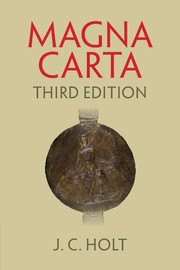Book contents
- Frontmatter
- Dedication
- Contents
- List of plates
- Preface to third edition
- Preface to second edition
- Preface to first edition
- Acknowledgements
- Abbreviations
- Introduction
- 1 The Charter and its history
- 2 Government and society in the twelfth century
- 3 Privilege and liberties
- 4 Custom and law
- 5 Justice and jurisdiction
- 6 Crisis and civil war
- 7 Quasi Pax
- 8 The quality of the Great Charter
- 9 The achievement of 1215
- 10 From distraint to war
- 11 The re-issues and the beginning of the myth
- Appendices
- References
- Index
- Plate section
3 - Privilege and liberties
Published online by Cambridge University Press: 05 July 2015
- Frontmatter
- Dedication
- Contents
- List of plates
- Preface to third edition
- Preface to second edition
- Preface to first edition
- Acknowledgements
- Abbreviations
- Introduction
- 1 The Charter and its history
- 2 Government and society in the twelfth century
- 3 Privilege and liberties
- 4 Custom and law
- 5 Justice and jurisdiction
- 6 Crisis and civil war
- 7 Quasi Pax
- 8 The quality of the Great Charter
- 9 The achievement of 1215
- 10 From distraint to war
- 11 The re-issues and the beginning of the myth
- Appendices
- References
- Index
- Plate section
Summary
The exercise of royal patronage was both a personal and a social function. Kings could not restrict it to their immediate followers. All their tenantsin-chief were their immediate vassals with a claim upon the royal favour and an expectation of reward. Moreover most kings were in need of money. They might grant privilege for both financial and political gain, and at a crisis in royal fortunes, as under Stephen, the stream of privileges quickly expanded into a torrent. There were two aspects to the sale of privileges, the seller's and the buyer's. On the one hand it reflected the policies and difficulties of the king. On the other it represented what his subjects wanted to buy. Their proffers, recorded from the earliest Pipe roll onwards under the heading of ‘new agreements’ or ‘new offerings’, are one of thesurest guides to their social and political aspirations.
These records reveal significant changes in the dispensation of privilege in the course of the twelfth century. The Pipe roll of 1130 and the rolls of the early years of Henry II suggest that the king's grants were making few permanent intrusions into the powers of the Crown. The most obvious of these is to be found in the numerous pardons of Danegeld, but, that apart, there is little evidence of irrecoverable wastage. The rolls of John's reign present a very different picture. By his time the sale of privileges had come to involve the permanent and final alienation of the rights of the Crown. It is not easy to pin this change down within narrower limits, partly because the offerings recorded in the Pipe rolls are only a proportion of the total, but the crucial period seems to have come with the accession of Richard I. He, more than any other, wasted his inheritance in the massive sale of office and privilege in which he engaged before his departure on the Crusade. From this there was no recovery.
- Type
- Chapter
- Information
- Magna Carta , pp. 69 - 87Publisher: Cambridge University PressPrint publication year: 2015



